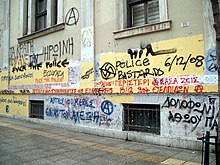Insurrectionalism
Insurrectionalism or insurrectional anarchism is an anarchist current that puts the idea of rebellion in the foreground.

In insurrectionalism, class struggle , uncompromising opposition and permanent attacks on social and political opponents are central ideas. He advocates selective cooperation in informal initiatives and affinity groups and rejects binding organizations with statutes, congresses and political programs such as anarchist federations and trade unions . It was theoretically conceived and developed as an independent anarchist current from the 1970s during a height of social tension in Italy. The contemporary insurrectionalist discourse refers particularly to the currents of illegalist and communist anarchism .
theory
Contemporary insurrectionalism builds on a number of key points that go back to tactics of illegalism and propaganda of the deed .
The "concept of 'attack' is at the heart of insurrectionalist ideology," as Joe Black explains. This would be prepared by actions and learning to act, but not prepared by propaganda , although propaganda played the role of clarifying the way in which one should act. It is important to learn in the action itself. The Italian text Ai ferri corti explains : “An individual with a passion for social upheaval and a 'personal' idea of the class struggle wants to do something immediately. If he or she studies the transformation of state and capital, it is to attack it, certainly not to go to sleep with a better idea of it. ”“ Attack is the rejection of mediation , appeasement, self-sacrifice, adjustment and compromise in struggle . "
Insurrection and revolution are important terms. Revolution is understood here “as a concrete event” that “has to be built on a daily basis by rather moderate attempts that do not have all the liberating characteristics of the real social revolution. These moderate attempts are insurrections. In these surveys of the most exploited and excluded in society and the most sensitized minority, a way opens up for broader strata of the exploited to join the flow of rebellion that pours into revolution. "

“The self-organization of the struggles” occupies a central place, because “the people who fight are autonomous in their decision-making and form of action, which is the opposite of a synthetic organization that always wants to gain control over the struggles. Struggles coordinated by a single organization can easily be integrated into the social power structure. Self-organized struggles, on the other hand, are by their nature uncontrollable. ”It is believed that the social system and its institutions feared that rebellious actions could escalate and expand into propaganda for the deed. "Small, repeatable actions carried out with simple means accessible to all are not controllable because of their simplicity and spontaneous implementability." This approach includes the principle that insurrectionalist anarchists should not see themselves as avant-garde or more conscious, wiser people, but as part of the "Exploited and marginalized".
Insurrectionalism sets temporary affinity groups against permanent organizations. This means the rejection of parties, trade unions and all other stable associations. The reason given for this is that they “make the struggles artificial and are elements of integration for state and capital.” An organization should only be formed informally, for a short time and for specific tasks and based on common inclinations.
The inherent transcendence of insurrectionalism of the dichotomy of the individual and the rest of society as well as individual anarchism and anarcho-communism is described as follows: "Insurrection begins with the need of individuals to break out of coercion and control and the longing to regain the shape of their own life that is appropriate for themselves." In contrast, it is stated that “Individuality only flourishes where equal access to the satisfaction of basic needs is the social reality. This equality of access is communism, how individuals use this access is up to them and their personal environment. So there is no equality or uniformity of individuals in true communism. "
Insurrectionalists refer largely to the concept of class struggle. In addition to the theoretical references to anarcho-communism and individual anarchism, there are often overlaps with situationism , autonomous politics , post-left anarchism and green anarchism .
literature
- Peter Nowak : After the frenzy of revolt. The events in Hamburg had an insurrectionalist character, jungle world , 33, 17 August 2017, p. 18 (also online ) On the theories of Joshua Clovers ( Riot. Strike. Riot , 2016), using the example of July 2017 in Hamburg
Web links
- Peter Gelderloos: Uprising vs. Organization. Reflections from Greece on a pointless split
- The militarization of the revolt , critical text by Teodor Webin on the Direct Action website, 2012
Individual evidence
- ↑ a b c Ireland, Red & Black Revolution # 11 - Anarchism, insurrections and insurrectionalism by Joe Black on ainfos.ca, July 19, 2006, accessed January 20, 2010
- ↑ Some Notes on Insurrectionary Anarchism ( Memento of April 23, 2010 in the Internet Archive ) by Venemous Butterfly and Willful Disobedience on the Wayback Machine of the Internet Archive, accessed February 1, 2016
- ↑ a b c d e f g h i j k l m Some Notes on Insurrectionary Anarchism ( Memento of April 23, 2010 in the Internet Archive ) by Venemous Butterfly and Willful Disobedience on the Wayback Machine of the Internet Archives, accessed February 1, 2016
- ↑ At Daggers Drawn with the Existent, its Defenders and its False Critics by anonymous ( Memento of August 5, 2009 in the Internet Archive ) in the Wayback Machine of the Internet Archives